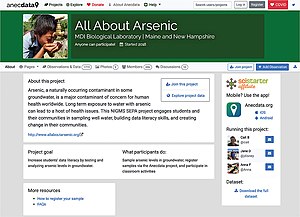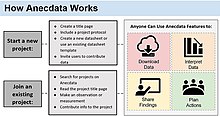
Citizen science is scientific research conducted with participation from the general public. There are variations in the exact definition of citizen science, with different individuals and organizations having their own specific interpretations of what citizen science encompasses. Citizen science is used in a wide range of areas of study, with most citizen science research publications being in the fields of biology and conservation. There are different applications and functions of citizen science in research projects. Citizen science can be used as a methodology where public volunteers help in collecting and classifying data, improving the scientific community's capacity. Citizen science can also involve more direct involvement from the public, with communities initiating projects researching environment and health hazards in their own communities. Participation in citizen science projects also educates the public about the scientific process and increases awareness about different topics. Some schools have students participate in citizen science projects for this purpose as a part of the teaching curriculums.
The Cornell Lab of Ornithology is a member-supported unit of Cornell University in Ithaca, New York, which studies birds and other wildlife. It is housed in the Imogene Powers Johnson Center for Birds and Biodiversity in Sapsucker Woods Sanctuary. Approximately 250 scientists, professors, staff, and students work in a variety of programs devoted to the Lab's mission: interpreting and conserving the Earth's biological diversity through research, education, and citizen science focused on birds. Work at the Lab is supported primarily by its 75,000 members.

The Naver Corporation is a South Korean internet conglomerate headquartered in Seongnam that operates the search engine Naver. Naver established itself as an early pioneer in the use of user-generated content through the creation of the online Q&A platform Knowledge iN. Naver also manages the video messenger SNOW, and group communication service BAND.

eBird is an online database of bird observations providing scientists, researchers and amateur naturalists with real-time data about bird distribution and abundance. Originally restricted to sightings from the Western Hemisphere, the project expanded to include New Zealand in 2008, and again expanded to cover the whole world in June 2010. eBird has been described as an ambitious example of enlisting amateurs to gather data on biodiversity for use in science.

UC Browser is a web browser developed by mobile internet company UCWeb, a subsidiary of the Alibaba Group. It was the most popular mobile browser in India and Indonesia, and the second most popular one in China as of 2017. Its world-wide browser share as of May 2022 is 0.86% overall according to StatCounter.

Environmental volunteers conduct a range of activities including environmental monitoring ; ecological restoration such as revegetation and weed removal, and educating others about the natural environment. They also participate in community based projects, improving footpaths, open spaces, and local amenities for the benefit of the local community and visitors. The uptake of environmental volunteering stems in part from the benefits for the volunteers themselves, such as improving social networks and developing a sense of place.
The MIT Senseable City Laboratory is a digital laboratory within MIT's City Design and Development group, within the Department of Urban Studies and Planning, which works in collaboration with the MIT Media Lab. The lab aims to investigate and anticipate how digital technologies are changing the way people live and their implications at the urban scale.
The MDI Biological Laboratory (MDIBL), formerly known as Mount Desert Island Biological Laboratory is an independent non-profit biomedical research institution founded in 1898 and located in Salisbury Cove, Maine, on Mount Desert Island. Its mission is to improve human health and well- being through basic research, education, and development ventures that transform discoveries into cures. In 2013, the Laboratory was designated a Center for Biomedical Research Excellence (COBRE) by the National Institutes of Health, which awarded the Laboratory a grant of $13 million over five years to expand the institution’s research program. The MDI Biological Laboratory has a full-time staff of 63, and will offer 23 research training courses in 2014.
GreenSpace is a social network game created to promote environmentalism. The game was developed by RocketOwl, Inc. and launched December 1, 2011. The game is free with in-app purchases.

iNaturalist is an American 501(c)(3) nonprofit social network of naturalists, citizen scientists, and biologists built on the concept of mapping and sharing observations of biodiversity across the globe. iNaturalist may be accessed via its website or from its mobile applications. iNaturalist includes an automated species identification tool, and users further assist each other in identifying organisms from photographs. As of 17 June 2023, iNaturalist users had contributed approximately 161,278,660 observations of plants, animals, fungi, and other organisms worldwide, and around 350,000 users were active in the previous 30 days.
Civic technology, or civic tech, enhances the relationship between the people and government with software for communications, decision-making, service delivery, and political process. It includes information and communications technology supporting government with software built by community-led teams of volunteers, nonprofits, consultants, and private companies as well as embedded tech teams working within government.
Steve Trash is an American magician. He was born in San Angelo, Texas.

The Microsoft Garage is a Microsoft program that encourages employees to work on projects about which they are passionate, despite having no relation to their primary function within the company. Employees from all divisions of Microsoft are free to take part in Microsoft Garage activities and small-scale innovation projects. The Microsoft Garage is a global program with locations on the main campus in Redmond, Washington, and several others spread all over the world, and a website that launched in October 2014 to share experimental projects with customers.

The NASA International Space Apps Challenge is an event where NASA Subject Matter Experts author challenges relating to real-world problems on Earth and Space and/or current NASA initiatives. Participants from around the world can form teams that work to develop solutions through the use of NASA and its Space Agency Partners’ open data over the two-day hackathon event.

iSpot is a website developed and hosted by the Open University with funding from the Open Air Laboratories (OPAL) network with an online community intended to connect nature enthusiasts of all levels.

Chris Harrison is a British-born, American computer scientist and entrepreneur, working in the fields of human–computer interaction, machine learning and sensor-driven interactive systems. He is a professor at Carnegie Mellon University and director of the Future Interfaces Group within the Human–Computer Interaction Institute. He has previously conducted research at AT&T Labs, Microsoft Research, IBM Research and Disney Research. He is also the CTO and co-founder of Qeexo, a machine learning and interaction technology startup.

The City Nature Challenge is an annual, global, community science competition to document urban biodiversity. The challenge is a bioblitz that engages residents and visitors to find and document plants, animals, and other organisms living in urban areas. The goals are to engage the public in the collection of biodiversity data, with three awards each year for the cities that make the most observations, find the most species, and engage the most people.

The COVID-19 pandemic has affected many scientific and technical institutions globally, resulting in lower productivity in a number of fields and programs. However, the impact of the pandemic has also led to the opening of several new research funding lines for government agencies around the world.

COVID-19 apps include mobile-software applications for digital contact-tracing - i.e. the process of identifying persons ("contacts") who may have been in contact with an infected individual - deployed during the COVID-19 pandemic.














